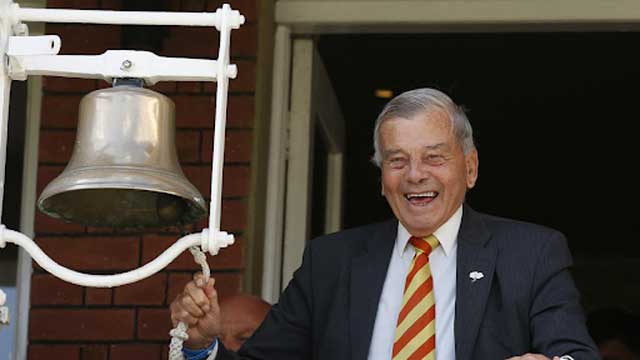Daijiworld Media Network – London
London, Sept 23: Harold "Dickie" Bird, one of cricket’s most iconic and beloved umpires, has died peacefully at his home at the age of 92, Yorkshire County Cricket Club confirmed.
Famed for his eccentric charm, deep knowledge of the game, and unmistakable presence on the field, Bird stood in 66 Test matches and 69 One Day Internationals, including three World Cup finals—an extraordinary career that earned him global recognition and affection.

Born in Yorkshire, Bird began his cricketing journey as a top-order batter for the county in 1956. He went on to play 93 first-class matches, scoring two centuries with a highest score of 181 not out against Glamorgan in 1959. After moving to Leicestershire in 1960, a persistent injury forced him into early retirement in 1964.
His transition to umpiring would define the next—and most celebrated—chapter of his life. Bird made his umpiring debut in May 1970 and quickly became a fixture on the international circuit. His quirky behaviour, such as a compulsive need for punctuality, only added to his appeal. On one occasion, while officiating his second match at The Oval, he arrived at 6 am for an 11am start and was caught by a policeman attempting to scale the locked gates.
Known for his reluctance to give leg-before-wicket (lbw) decisions, Bird’s caution may have been ill-suited for the era of DRS (Decision Review System), but he was admired for consistently offering the benefit of the doubt to batters—with one memorable exception. On the morning of his final Test, between England and India at Lord’s, he entered the field in tears after receiving a guard of honour—only to give England’s Mike Atherton out lbw in the first over.
His career was marked by many iconic moments. In 1995, during a Test match between England and the West Indies at Old Trafford, Bird famously halted play due to excess sunlight reflecting off a window—an incident that became cricketing folklore.
Bird was also a favourite target for practical jokers. He once confiscated a mobile phone from Allan Lamb, only for Ian Botham to call it mid-innings and ask him to tell Lamb to “get a move on”.
Off the field, Bird was known for his humility and dry humour. Though he once dreamed of becoming a professional footballer, a knee operation at 15 curtailed that ambition. Instead, he turned to cricket, playing for Barnsley’s first XI alongside future greats like Geoffrey Boycott and journalist Michael Parkinson.
He was appointed MBE in 1986 and later OBE in 2012, honours that reflected his outstanding service to cricket and his enduring popularity with players and fans alike.
In a heartfelt statement, Yorkshire County Cricket Club paid tribute to his life and legacy: “He leaves behind a legacy of sportsmanship, humility, and joy – and a legion of admirers across generations. He will be truly missed by all at the Club having spent an incredible amount of time in support of everyone here and will be remembered as one of the greatest characters in Yorkshire's history.”
In 2014, Bird returned to his beloved Yorkshire as Club president, a fitting tribute for a man whose name had become inseparable from the spirit of the game.